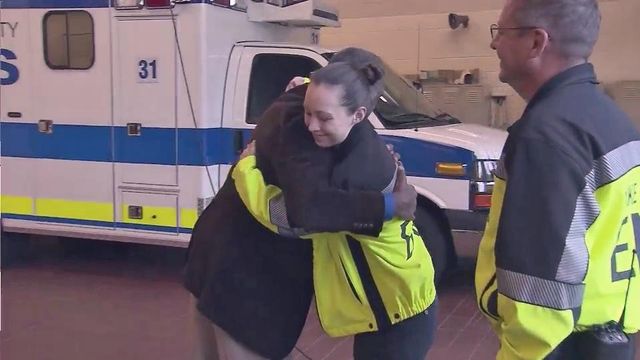Wake EMS: Longer CPR attempts are saving lives
When William Fulton went into cardiac arrest last year, Wake County paramedic Katie Cooper-Escobar performed CPR on him for 40 minutes, saving his life. If Fulton's heart attack had happened 10 years ago, he might not have lived.
Posted — UpdatedFor years, conventional wisdom said if paramedics didn't get a pulse in a patient after about 20 minutes of resuscitation, they weren't going to get one. About 10 years ago, Wake County EMS decided to try something different.
“We were getting good signs that we may get that pulse back a little later on, so we didn't want to stop at 20 or 25 minutes. We continued to go,” said Jeff Hammerstein, Wake County EMS district chief.
Wake EMS officials thought doing resuscitation for 45 minutes, or even an hour, along with cooling patients, led to better outcomes. SAS in Cary looked at seven years of Wake County EMS data and confirmed the hunch.
“There's 100 people who left the hospital alive and healthy who wouldn't have under the old protocol,” said Paula Henderson, vice president of state and local government practice for SAS.
Now, longer resuscitation protocol is standard, and the survival rate for cardiac arrest patients in Wake County has increased 48 percent, according to Wake EMS.
Fulton spent some time in a hospital and is back to work as a math teacher at the Governor Morehead School for the Blind. He says Cooper-Escobar gave him a priceless gift that day. She says she was just doing her job.
“We did our usual protocol and, luckily for us and him, it worked out that day,” she said.
• Credits
Copyright 2024 by Capitol Broadcasting Company. All rights reserved. This material may not be published, broadcast, rewritten or redistributed.





